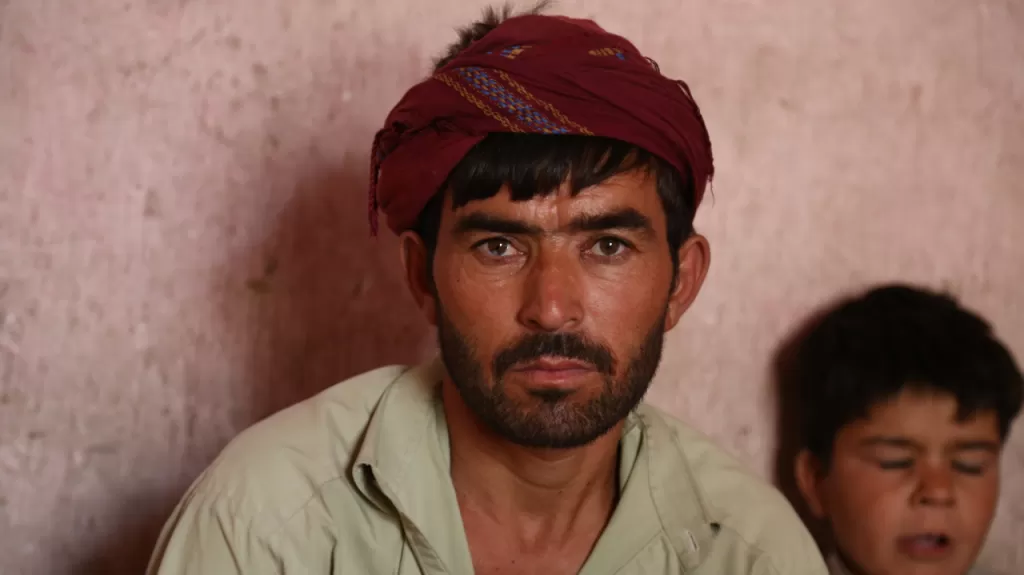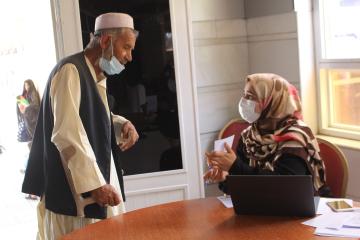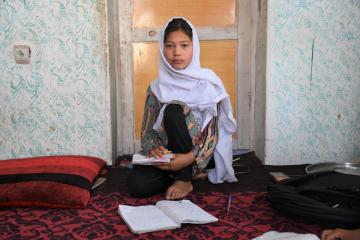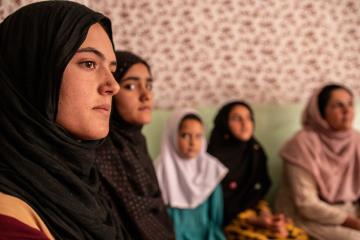Providing emergency cash for high risk families
Experts warn that up to 97% of the Afghan population could be plunged into poverty in 2022. All 34 provinces of Afghanistan have been found to be in severe or critical need, with 82% of families that previously had an income reporting they earned nothing at all in February 2022.
66% of DEC funds provided high-risk, marginalised and displaced families with cash assistance and vouchers, giving 12,600 households the flexibility to spend funds on their most urgent needs, such as food, warm clothes, or fuel. A survey by Save the Children found that most recipients are using the cash assistance to buy food, representing 82% of emergency cash spending in Kabul, 75% in Kandahar, and 60% in Nangahar and Kunar.
Helping families survive the winter months
Afghanistan has the third largest internally displaced population in the world, with conflict forcing 800,000 people to leave their homes in 2021 alone, according to UNOCHA. 80% of displaced people are women and children. Most live in temporary shelters that leave them dangerously exposed to Afghanistan’s harsh winters, risking illness and death from hypothermia and acute respiratory infections. In December 2021, DEC charity Save the Children found that 8.6 million Afghan children lived in households without enough blankets to go around, and more than 3 million children had inadequate heating to keep them warm.
In the first three months of the DEC response, 15% of funds has provided 2,900 households with cash assistance for shelter, fuel and blankets and delivered shelter and winter and household items including pressure cookers, gas bottles, cooking utensils and pots.
Providing emergency food to help save lives
18.9 million Afghans, nearly half the population, are estimated to remain acutely food insecure while 3.9 million children are acutely malnourished – the highest number in emergency food insecurity in the world. And despite the powerful humanitarian response, with global food prices rising due to the Ukraine conflict and Afghanistan’s own harvest set to fail again this year, the situation remains alarmingly severe. Many parents are restricting their own meals so their children can eat.
11% of DEC funds in the first months of our response has provided 13,300 households with either cash for food or food packages of, for example, wheat flour, vegetable oil, lentils, salt and rice.
Supporting a devastated healthcare system
Afghanistan’s healthcare system – already on its knees after decades of conflict and under-investment – is buckling under the rising demand fuelled by Covid-19, chronic poverty, and spiking rates of malnutrition. The country has one of the highest rates in the world both of stunting (impaired growth) among children at 36%; and of disability which affects 79% of adults and 17% of children, increasing their health needs, susceptibility to illness and risk of death. Many health facilities have been destroyed and those that do exist are operating with critical gaps in medicine, personnel and equipment, with some healthcare workers having gone unpaid for months.
In the first months of the response, 34,800 people have accessed health services funded by DEC at local health centres. 4% of DEC funds has been spent on providing primary and basic health services, including through mobile health units.
Ensuring access to clean water and hygiene
Access to clean water, sanitation and hygiene services is often one of the casualties of displacement, with 79% of displaced households reporting insufficient water access.
In the first months of the response, 3% of DEC funds has been spent on distributing hygiene kits, with 13,500 households receiving items such as toothbrushes, toothpaste, soap, sanitary pads and buckets; promoting hygiene awareness including of Covid-19; and repairing and constructing facilities for safe drinking water.





